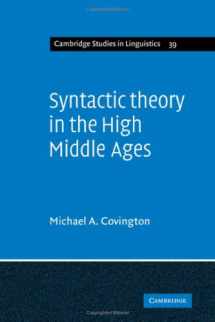
Syntactic Theory in the High Middle Ages: Modistic Models of Sentence Structure (Cambridge Studies in Linguistics, Series Number 39)
ISBN-13:
9780521256797
ISBN-10:
0521256798
Author:
Michael A. Covington
Publication date:
1985
Publisher:
Cambridge University Press
Format:
Hardcover
171 pages
FREE US shipping
Book details
ISBN-13:
9780521256797
ISBN-10:
0521256798
Author:
Michael A. Covington
Publication date:
1985
Publisher:
Cambridge University Press
Format:
Hardcover
171 pages
Summary
Syntactic Theory in the High Middle Ages: Modistic Models of Sentence Structure (Cambridge Studies in Linguistics, Series Number 39) (ISBN-13: 9780521256797 and ISBN-10: 0521256798), written by authors
Michael A. Covington, was published by Cambridge University Press in 1985.
With an overall rating of 4.1 stars, it's a notable title among other
books. You can easily purchase or rent Syntactic Theory in the High Middle Ages: Modistic Models of Sentence Structure (Cambridge Studies in Linguistics, Series Number 39) (Hardcover) from BooksRun,
along with many other new and used
books
and textbooks.
And, if you're looking to sell your copy, our current buyback offer is $0.3.
Description
In this study Michael Covington considers the origins and development of the theories of sentence structure formulated by the Modistae, a group of grammarians and logicians who flourished in Paris between about 1270 and 1310. Some of the concepts of the medieval theoretical framework, notably government and dependency, have survived to the present day, and Dr Covington introduces insights from modern grammatical theories where appropriate. Nevertheless his principal aim is not to compare medieval and modern theories, or to provide a comprehensive historical study. Rather, recognising that 'it is the difference as much as the similarity that makes the Modistae interesting', Dr Covington offers an original critical exegesis of these influential theories. The book will be accessible both to linguists who may know little about medieval philosophy and to medievalists who may know little about linguistics.


We would LOVE it if you could help us and other readers by reviewing the book
Book review

Congratulations! We have received your book review.
{user}
{createdAt}
by {truncated_author}


